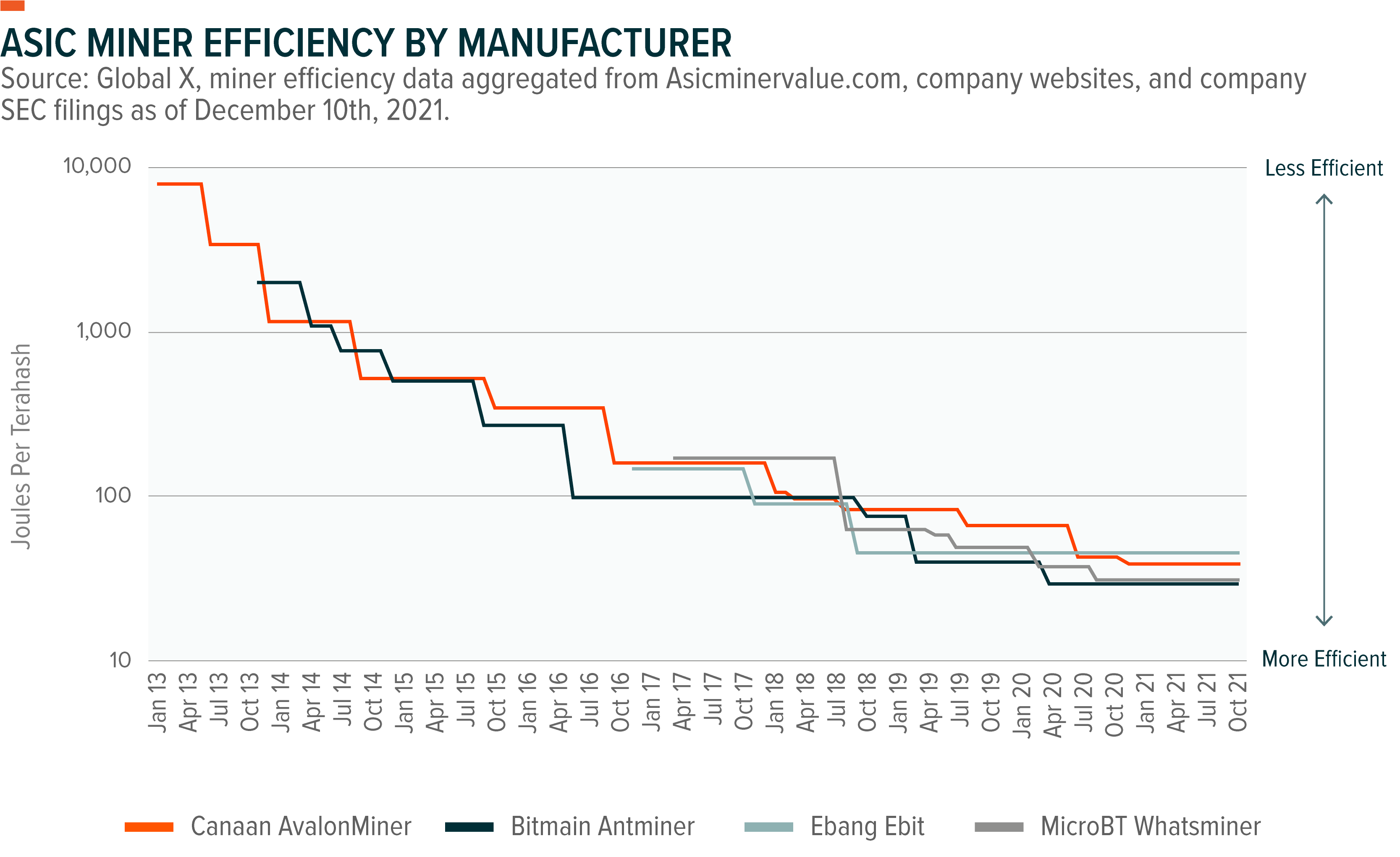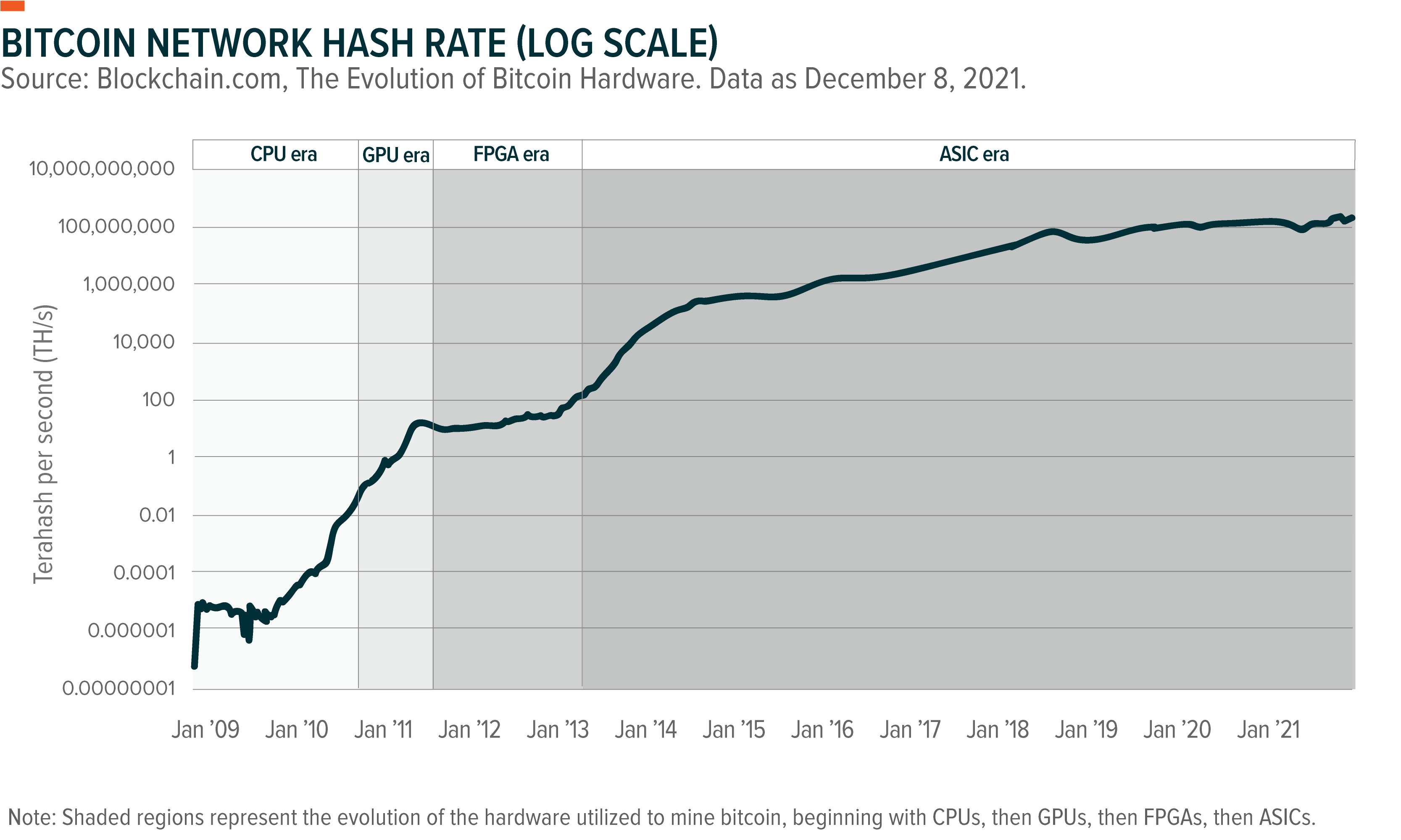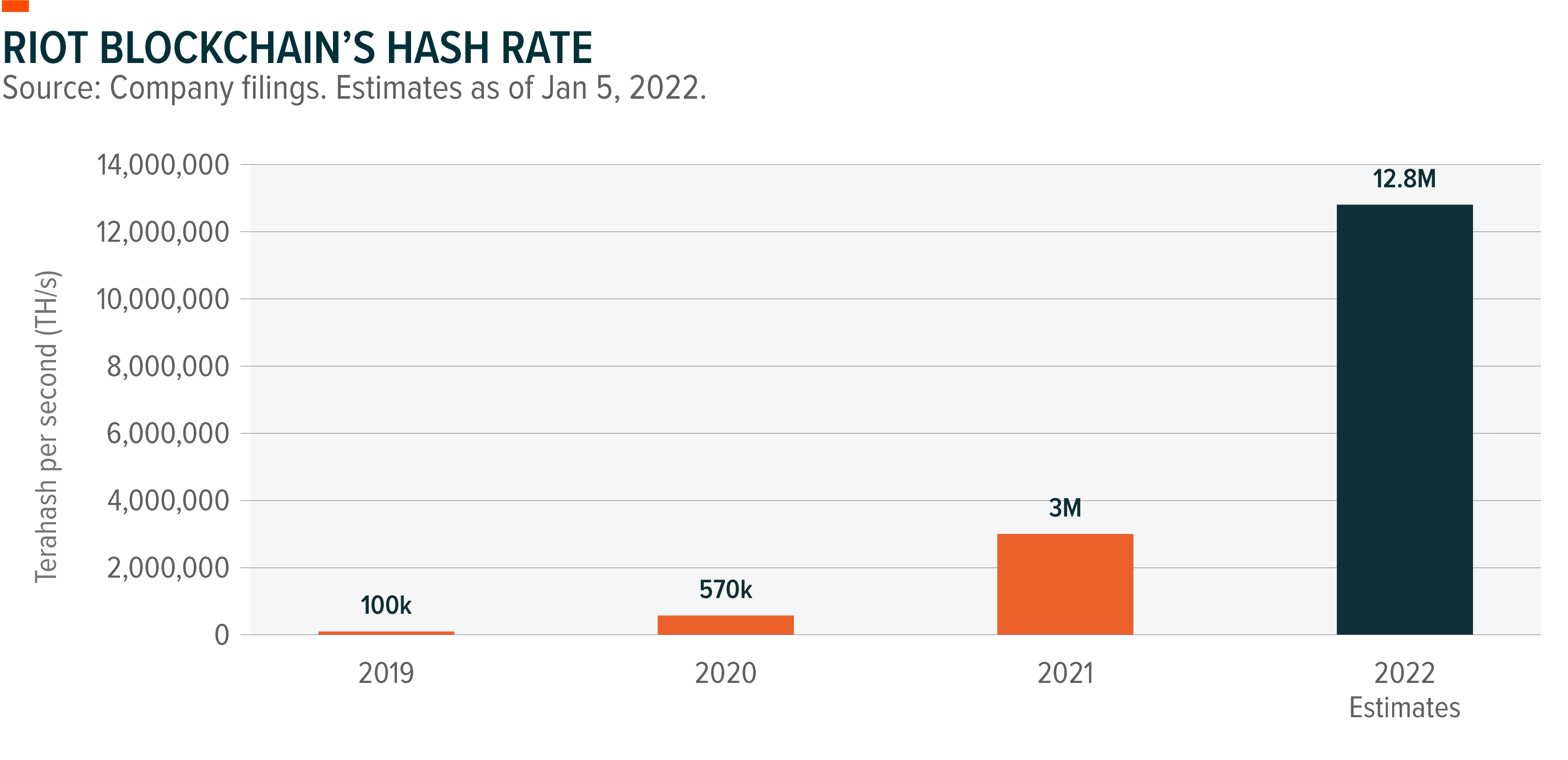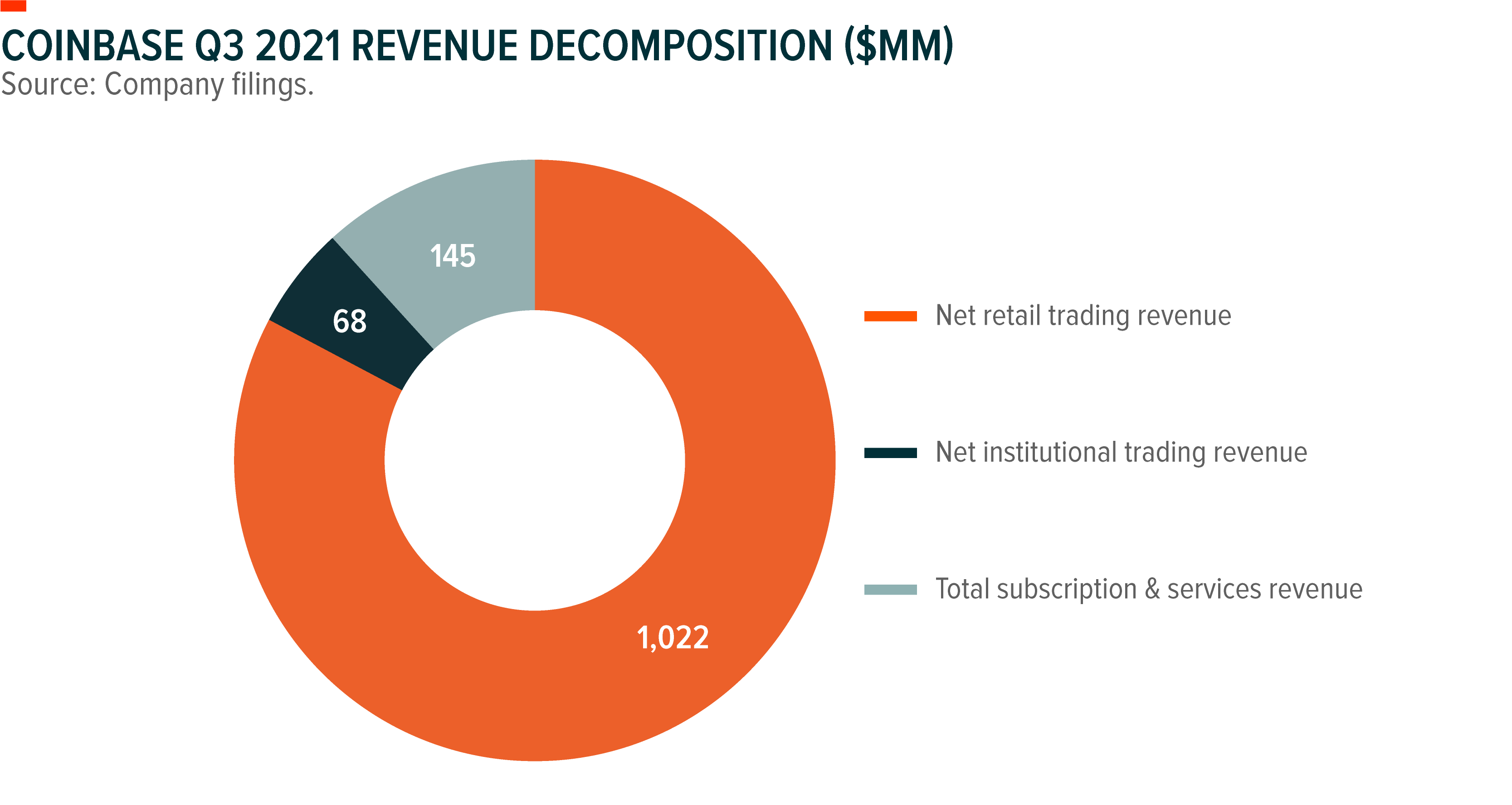Four Companies Leading the Rise of Blockchain Technology
While many investors may be familiar with cryptocurrencies such as bitcoin and ether, investors are oftentimes less familiar with the burgeoning ecosystem of companies aiding in the development of the blockchain and digital assets space more broadly. In this piece, we identify four key segments in the blockchain equity space today, as well as a key business that operates in each segment, including:
- Blockchain & Digital Asset Hardware: Canaan:A fabless integrated circuit designer, delivering supercomputing solutions through their proprietary high-performance application-specific integrated circuits (ASICs). The vast majority of their revenue comes through sales of ASICs for bitcoin mining today.
- Digital Asset Mining: Riot Blockchain:A leading U.S. bitcoin miner and hosting service provider. Riot operates the Whinstone data center which is the largest bitcoin mining and hosting facility in North America.
- Blockchain & Digital Asset Transactions: Coinbase:A large cryptocurrency exchange and a leading provider of end-to-end financial infrastructure for the crypto economy.
- Blockchain Applications: Overstock:An e-commerce business that accepts payment in cryptocurrency and maintains a portfolio of venture investments in blockchain companies.
Canaan: A manufacturer of bitcoin mining equipment
Canaan is one of the largest manufacturers of bitcoin mining equipment alongside Bitmain, MicroBT, Ebang, and a few smaller manufacturers. Canaan employs a fabless model where they primarily focus on product design and R&D, while employing leading fabrication partners such as SMIC, TSMC, and Samsung for the chip fabrication.1
The hardware required to profitably mine bitcoin has evolved tremendously alongside the network’s expansion. Early miners utilized central processing units (CPUs), then graphics processing units (GPUs), then field-programmable gate arrays (FPGAs), and now application-specific integrated circuits (ASICs) which are the last viable hardware solution to profitably mine bitcoin today.2 Canaan led the latest stage of this transition being the first company to develop bitcoin miners utilizing ASIC technology in 2013.3
ASICs are chips designed to solve a specific application as opposed to general purpose computation. In the case of ASICs for bitcoin mining, these are chips designed solely to calculate the output of the SHA-256 cryptographic hash function as quickly as possible (See Bitcoin: The Basics for more detail on bitcoin mining and cryptographic hash functions).
Canaan’s primary business is selling ASICs for bitcoin mining under their AvalonMiner brand, but they additionally sell parts for bitcoin miners, after-sale technical services, and they have a miner leasing operation as well. More recently they additionally entered a joint mining operation utilizing their AvalonMiners in Kazakhstan.4 Canaan’s technical supercomputing expertise gained through the development of ASICs for bitcoin mining has allowed them to additionally enter the ASIC market designed for AI applications, although this remains a miniscule portion of their business today.
While Canaan previously enjoyed the benefit of being first to market, they have faced steep challenges in recent periods. Canaan has fallen behind the two privately held industry leaders in Bitmain and MicroBT with the efficiency of Canaan’s AvalonMiner series lagging behind that of Bitmain’s Antminer series and MicroBT’s Whatsminer series. Additionally, Canaan and their primary competitors are all Chinese companies, so they may have a heightened exposure to regulatory risks given China’s recent ban on cryptocurrency trading and mining.5

However, the overall demand for bitcoin miners today may exceed the headwinds from these challenges. Bitcoin is very profitable to mine today across a variety of ASIC machines and given the backdrop of supply constraints in the chip market, it may take multiple years for marginal cost to approach marginal revenue. This creates demand for ASICs beyond the state-of-the-art chips produced by Bitmain and MicroBT today. For example, using the bitcoin price and network hash rate as of 12/9/2021 and assuming an industrial energy cost of $0.03 per kilowatt hour – in line with energy costs noted by hosting service provider Bitfury6 – Canaan’s AvalonMiner 1246 is still generating a profit of roughly $25 per day.7 As a comparison, the top-of-the-line miners from Bitmain and MicroBT could profit closer to $31 per day under these same conditions, but they also have a correspondingly higher purchase price. Continued demand for AvalonMiners is evidenced by recent purchase orders from large mining operations such as Hive Blockchain, Genesis Digital Assets, and Mawson.8, 9, 10
Riot Blockchain: A U.S. cryptocurrency mining business focused on bitcoin
Riot Blockchain is one of the largest publicly traded U.S. bitcoin miners, generating revenue from bitcoin mining and data center hosting services. Simply put, bitcoin miners are in the business of acquiring bitcoin mining hardware (ASICs) and finding data centers with the lowest power cost to deploy them at.
Bitcoin mining is the act of utilizing electricity and advanced hardware to secure the Bitcoin blockchain by a process of brute-force computation. Bitcoin miners iterate different inputs through the SHA-256 cryptographic hash function as quickly as possible, searching for a rare output. The output of a cryptographic hash function is known as a hash, and the hash rate is a measure of the number of hashes that can be calculated per second.
An individual miner’s hash rate measures the size of a mining operation, while the total Bitcoin network hash rate is the sum of all the individual miners’ hash rates, and it’s a measure of the total computational power securing the Bitcoin network in aggregate. Hash rate is often measured per second in terahashes (TH/s), petahashes (PH/s), or exahashes (EH/s), but for consistency we’ll utilize terahashes which each denote one trillion hashes.
Riot’s hash rate as of December 2021 is approximately 3,000,000 TH/s, representing ~1.7% of the Bitcoin networks total hash rate of 173,000,000 TH/s.11,12 Furthermore, Riot is expecting to grow their hash rate to 12,800,000 TH/s by the end of 2022, a 327% increase reflecting a large purchase agreement of Bitmain Antminers coming online monthly through Q4 2022.13 In recent periods, Riot has tapped the capital markets to fund their operations, providing flexibility to hold their mined bitcoin as an investment on their balance sheet. As of December 2021, Riot held approximately 4,889 bitcoins on their balance sheet.14

The expected revenue generated from bitcoin mining is largely predictable and measured as the bitcoin miner’s hash rate as a proportion of the total network hash rate. Currently, 900 new bitcoins are mined per day on average, and assuming no change in the Bitcoin network’s hash rate, Riot would be expected to mine ~1.7% of these bitcoins, or ~15.3 bitcoin per day. Riot would receive additional mining revenue beyond this from transaction fees, but transaction fees are more dynamic and difficult to forecast, while also only representing approximately 1-2% of the total revenue generated from mining currently.15
Riot has taken the approach of vertically integrating their business, acquiring both bitcoin miners and the hosting facilities to deploy their machines. In 2021, Riot completed the blockbuster acquisition of Whinstone US, the largest bitcoin mining and hosting facility in North America.16 Whinstone, based in Rockdale, Texas, is located on a 100-acre site with 300 megawatts (MW) of currently developed power capacity and an additional 400 MW infrastructure expansion currently in process.17 The site is subject to a long-term lease agreement with electricity provided via a long-term power supply contract with the state.18
The Whinstone acquisition secured the data center infrastructure for Riot’s large purchases of bitcoin miners coming online throughout 2022, but it additionally diversified Riot’s top line by allowing them to sell data center hosting services to other miners. Data center hosting sales made up ~17% of Riot’s revenue in Q3 2021 with bitcoin mining revenue generating the remainder.19
The purchase of Whinstone additionally provided flexibility to innovate on the infrastructure side of the business. In October 2021, Riot announced the development of the first industrial-scale immersion-cooled bitcoin mining operation, noting that 200 MW of their expansion would utilize immersion cooling instead of air-cooling. Immersion cooling allows machines to run with lower internal temperatures, prolonging equipment longevity and reducing maintenance costs. Immersion cooling additionally allows for overclocking machines, which Riot expects will increase their hash rate per machine by 25%, potentially as much as 50%.20

Coinbase: A digital assets exchange and leading provider of cryptocurrency infrastructure
Coinbase is one of the largest cryptocurrency exchanges and cryptocurrency infrastructure and service providers. Coinbase was launched in 2012 with the mission of providing anyone access to bitcoin. The company has expanded tremendously throughout the years beyond their core exchange business culminating in their direct listing on the NASDAQ in April 2021. As of December 2021, Coinbase had more than 73mm verified users, they operated in more than 100 countries, and their cryptocurrency volume traded in the past quarter nearly eclipsed $330 billion dollars.21
Coinbase is a full-service crypto platform today with operations spanning retail and institutional trading, lending, custody, wallets, staking, debit cards, blockchain analytics, commerce integration, cloud services, a soon-to-launch non-fungible token (NFT) marketplace, and more. While Coinbase’s revenue is still dominated by retail trading today, institutional trading revenue and subscription and services revenue are making up a growing portion of their topline. Subscription and services revenue encompasses a very diversified mix of revenues, and this segment grew by a staggering 1256% quarter-over-quarter as of 9/30/2021.22

Within the subscription and services segment, revenue from blockchain rewards is the largest contributor. This line item was bolstered by Coinbase’s acquisition of Bison Trails in January 2021, a blockchain infrastructure platform-as-a-service company.23 Bison Trails allows anyone to participate in proof of stake blockchain networks without requiring the technical know-how of running a validator node. Bison Trails provides services allowing individuals, custodians, crypto exchanges, and funds the ability to earn a staking yield on certain cryptocurrencies which they take a performance fee on.
Another key business for Coinbase is their cryptocurrency custody business. Coinbase Custody offers a standalone and independently-capitalized business providing custodial solutions for funds, institutional clients, and high net worth individuals. Coinbase Custody was built through the acquisition of Xapo’s institutional business in August 2019, and it’s believed that Coinbase Custody is the largest cryptocurrency custodian in the world, maintaining custody of the assets held across Grayscale’s full suite of products, amongst many other clients.24
Other drivers of service revenue include the Coinbase Earn program, where cryptoasset issuers use Coinbase as a medium to disseminate educational content about their cryptocurrency or token to Coinbase’s large retail user-base. These cryptoasset issuers provide the end-user with a nominal amount of the cryptocurrency for consuming the educational content about their network, and Coinbase charges a small distribution fee for providing this access.25 Coinbase also generates interest revenue by providing crypto-backed loans to retail and institutional clients.26
Overstock: An eCommerce business that supports cryptocurrencies and invests in their innovation
Overstock is predominantly known as an e-commerce business providing a range of products such as furniture, home décor, and housewares. However, beginning in 2014, Overstock implemented a multifaceted approach to increase its exposure to blockchain technology and cryptocurrencies. First, the company partnered with Coinbase to allow their e-commerce customers to pay with bitcoin, and Overstock added the flexibility to hold portions of this bitcoin earned on their balance sheet.27, 28 Second, Overstock began a more holistic initiative to develop and advance blockchain technology through their subsidiaries which were collectively referred to as the Medici business.29
Medici’s focus was to leverage the transparency and security properties of blockchain technology to solve problems across six core areas: identity management, property rights and management, central banking and currencies, capital markets, supply chains and commerce, and voting systems. The Medici business was primarily comprised of Medici Ventures, a venture capital business investing in blockchain companies, and tZERO, a business applying blockchain technology to capital markets, predominantly in the area of digital asset securities.
tZERO operates a regulated alternative trading system (ATS) for the continuous trading of security tokens. Private companies can engage tZERO to have a portion of their capital structure digitized, allowing for the continuous trading of a private security through traditional brokerage channels without requiring a liquidity event such as an IPO. The Aspen Digital Token (ASPD) which is listed for trading on tZERO is the most prominent example of a private security token. ASPD is a Tezos-based security token representing fractional ownership in the St. Regis Aspen Resort, a five-star, 179-room hotel in Aspen, Colorado.30 Overstock and tZERO itself also have security tokens trading on tZERO.31, 32 Beyond security tokens, tZERO also offers an app for trading cryptocurrencies, providing access to bitcoin and an array of other alternative cryptocurrencies.
Conclusion
The four companies presented here represent key participants across the blockchain and digital assets ecosystem today. The ecosystem of publicly traded blockchain companies has evolved tremendously over the past few years, and there are dozens of companies operating across these segments today beyond those highlighted in this piece. Additionally, there is a rich pipeline of established blockchain companies expected to access the public capital markets for the first time through special purpose acquisition companies (SPACs) and initial public offerings (IPOs) over the coming year.
While many of these companies may not receive the investor attention commanded by cryptocurrencies today, these companies provide a broad, thematic exposure to the picks-and-shovels of the blockchain and digital assets space, and they could offer a complimentary exposure to direct cryptocurrency investing.
Related ETFs
BKCH – The Global X Blockchain ETF (BKCH) invests in companies positioned to benefit from the increased adoption of blockchain technology.
BITS – The Global X Blockchain & Bitcoin Strategy ETF (BITS) invests in a mix of bitcoin futures and companies positioned to benefit from the increased adoption of blockchain technology. BITS will not invest directly in bitcoin.
Click the fund name above to view the fund’s current holdings. Holdings subject to change. Current and future holdings subject to risk.
